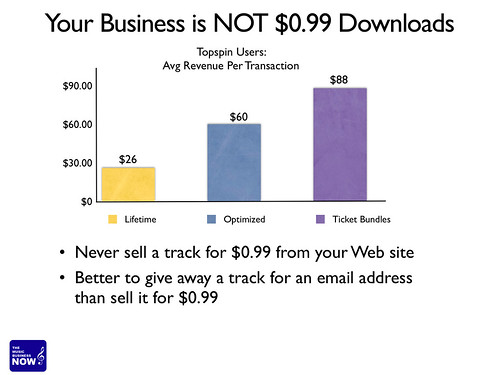It's The Experience That Makes Music Valuable; Not The Legal Rights
from the proving-the-point dept
Ethan Kaplan strikes again. The always-thoughtful (and thought-provoking) former recording industry tech exec has put up a blog post that not only explains why Turntable.fm is so popular, but also reframes why the record labels have failed to embrace almost every cool new internet service. You should read the whole thing, but the short version is that users care about the experience, the big labels care about the legal rights. And it's really the experience that makes things valuable. But, if you (like the labels) have bet on the licenses, rather than the experience, then any time someone else makes the experience more valuable, all it does is highlight just how little value there really is in the licenses.Value in the music business though is an odd thing: the more value added to the music by the fan directly, the less influence the rights holders have over it, and the more influence the creators of representational systems (i.e., turntable.fm) and rights creators have (i.e., artists going directly on turntable.fm with stuff that their labels don’t own). And rights holders do not like being taken out of the value equation.To some extent, this is a (better) rephrasing of a point I tried to make a few years ago, that those who focus on "copyright" as the key to success in any industry are using copyright as a crutch. Rather than building real value and business models that users want, they're using this crutch which provides a simple business model. It makes them lazy, uncreative, uninterested in real user value -- and violently against any sort of innovation that increases value while diminishing the importance of that crutch.
Call it Kaplan’s Law: the more value a non-music company adds to the fan/artist relationship, the bigger the threat to those who’s business depends on being between the two.
The really interesting points are when you remove that crutch and realize that for a business model to work, it has to provide real value that willingly brings users in. Until the music industry figures this out, they're going to continue to miss the boat on important innovation on both the product side and the business model side.
But artists don't have to miss that boat. As Kaplan suggests, now is the time to focus on the "experience rights," not the "legal rights":
To artists: own your experiential rights. Participate in technology and hold your representatives (lawyers, labels and management companies) to the standards you want your content held to once you lose control of it.
Filed Under: copyright, culture, experience, licenses, rights
Companies: turntable.fm


